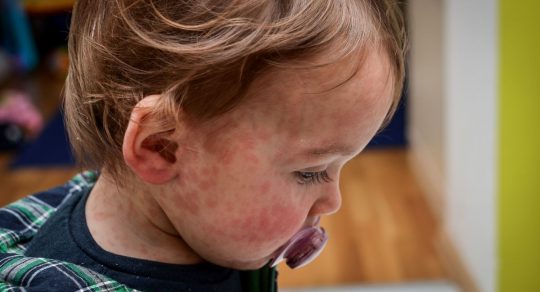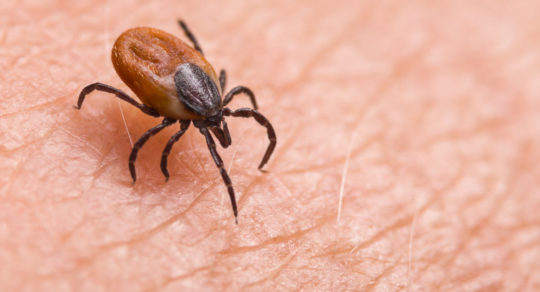DIVISION
Infectious Diseases and Epidemiology
On This Page
The Division of Infectious Diseases and Epidemiology is committed to providing high-quality and patient-centered clinical care, innovating in medical education to ensure future leaders in infectious diseases, conducting high-quality research, and creating an intellectually exciting, diverse and supportive environment in which to work.
In 1976, Dr. Robert C. Aber became the first adult infectious diseases physician in central Pennsylvania, and was the sole adult infectious diseases physician at Penn State Health Milton S. Hershey Medical Center until a second faculty hire in 1979. Soon thereafter, Dr. Aber became the inaugural chief of the newly formed Division of Infectious Diseases and Epidemiology.
Several decades after the division’s creation, we now consist of 14 distinguished full-time faculty with support from mid-level providers, infectious diseases pharmacists, fellows, specialty nurses and staff. We collaborate closely with other clinical and research departments as well as medical educators to bring exceptional infectious diseases expertise to central Pennsylvania and to serve as national and international academic leaders. Within our division you will find something for everyone.
We are committed to providing outstanding adult infectious diseases services to our region with strong expertise in HIV/AIDS, infections related to transplant and cancer, bone and joint infections, and general infectious diseases. We see patients in both the inpatient and outpatient settings and facilitate a wide geographic range of care with clinic sites in Hershey, Harrisburg, Lebanon and Altoona. We also offer telehealth options.
Our faculty participate in a variety of research endeavors from basic to translational science to clinical trials. Our Antimicrobial Stewardship Program was one of the inaugural institutions designated as an Antimicrobial Stewardship Center of Excellence. We regularly present our work at regional, national and international scientific meetings and publish in diverse and influential academic journals within the field. We also strive to mentor and teach future infectious diseases leaders through clinical care electives, research projects, quality improvement initiatives and a robust fellowship training program.
Infectious diseases are among the most critical health problems for people living in the United States and across the globe. As infectious diseases providers, it is essential that we are nimble, adapting to combat new infections as they arise. In this regard, during the COVID-19 pandemic, my extraordinary colleagues rose to the occasion. We cared for thousands of hospitalized COVID-19 patients, led international research studies, and supported the Penn State Health system to allow high-quality patient care to continue despite a global pandemic. I am proud to lead this division and invite you to explore the links to learn more about our team. Thank you for visiting.
Cynthia J. Whitener, MD
Chief, Division of Infectious Diseases and Epidemiology
Professor of Medicine
Education in Infectious Diseases and Epidemiology
The Division of Infectious Diseases and Epidemiology is committed to the education of students, residents, fellows, faculty and the community. The training and education programs offer a number of clinical and scientific opportunities to support the next generation of infectious diseases physicians and encourage ongoing growth of faculty members in an innovative and supportive environment. The division provides formal and informal teaching through faculty involvement with the College of Medicine MD degree core curriculum and public health graduate programs. Division members also support teaching efforts at the Penn State Eberly College of Science and the Huck Institutes of the Life Sciences.
The division provides education through clinical training programs and facilitates popular medical student and internal medicine infectious diseases elective rotations in both the inpatient and outpatient settings. Under the leadership of fellowship program director Tonya Crook, MD, and associate program director David Ingram, DO, the division is also home to an ACGME-accredited fellowship program that admits two fellows per year.
Faculty members understand the importance of engaging the community in education activities. They frequently participate in media outreach, high school education programs, and community Q&A forums to provide central Pennsylvania with reliable and timely infectious diseases education.
Of paramount importance to the division is providing faculty an environment where ongoing learning is encouraged and supported. The division hosts two Internal Medicine Grand Rounds per year, bringing national infectious diseases leaders to Penn State College of Medicine. It also supports faculty, fellows and designated support staff with a stipend and protected time for continuing medical education.
Infectious Diseases Fellowship
Research in Infectious Diseases and Epidemiology
The Division of Infectious Diseases and Epidemiology faculty are actively engaged in innovative research supported by funding from the National Institutes of Health, Health Resources and Services Administration, Global Health Innovative Technology Fund, and other federal and non-federal sponsors. From 2020-2022, division faculty published over 50 manuscripts and abstracts in high-impact peer-reviewed journals, including 15 manuscripts involving trainees.
The division performs a range of activities from basic and translational science to large, multi-site interventional clinical trials. Areas of division expertise include viral structure and cryoEM reconstruction techniques, diagnostic and therapeutic modalities for vector borne diseases, understanding the molecular mechanisms underlying the assembly of retrovirus particles, comprehending the role of substance use disorder in infectious diseases, optimizing the care of individuals living with HIV and hepatitis C, providing research opportunities for patients who have undergone solid organ or bone marrow transplant, developing and directing a comprehensive Antimicrobial Stewardship Program, assessing antimicrobial dosing strategies, leading pivotal COVID-19 therapeutics trials, and understanding post-COVID-19 sequelae.
Division faculty are integral to the research mission at Penn State College of Medicine and serve in research leadership roles within the College of Medicine and as national experts on study sections and research planning groups.
Research Labs
Current Studies
View active infectious diseases clinical trials in StudyFinder, our searchable database of clinical research taking place at Penn State Health Milton S. Hershey Medical Center and Penn State College of Medicine.
Contact Us
To contact the Division of Infectious Diseases and Epidemiology, email DivisionofInfectiousDiseases@pennstatehealth.psu.edu or call 717-531-8881. Follow the division on Twitter at PennStateID.
Open Clinical Studies
Sponsors and Collaborators: University of Minnesota, National Institute of Allergy and Infectious Diseases (NIAID)
Site Principle Investigator: Catharine I. Paules, MD
ID Division investigators: Catharine I. Paules, MD, Rezhan Hussein, MD, Kathleen Julian, MD
Lead study coordinator: Michael Klemick, BS
This study is for people in the hospital with COVID-19 and will assess an investigational anti-viral (S-217622, an anti-SARS-CoV2 3C-like protease inhibitor). The study design is a randomized, placebo-controlled, multi-center international clinical trial that will evaluate the clinical efficacy of S-217622 when added to standard of care therapies.
ClinicalTrials.gov Identifier: NCT05605093
For more information on this study, please contact: Dr. Paules at 717-531-8881 (or via Tiger Text) or lead study coordinator Michael Klemick at 717-531-0003, ext. 282268 (or via Tiger Text).
Research Leadership

Vice Dean for Research and Graduate Studies, Penn State College of Medicine
Clinical Care in Infectious Diseases and Epidemiology
Division of Infectious Diseases and Epidemiology faculty manage complicated infections thoroughly and with compassion in both the inpatient and outpatient settings, as well as by utilizing telehealth options. The general infectious diseases faculty have a broad range of expertise including COVID-19 and other respiratory virus infections, skin and soft tissue infections, cardiac device infections, blood stream infections, infections related to complicated wounds, tick-borne infections, travel-related infections and tuberculosis.
Specialized services provide comprehensive and collaborative care for infections related to transplant or cancer, and bone and joint infections. Members of the division are leaders in the care of persons living with HIV, and the division receives key funding from the Health Resources and Services Administration’s Ryan White HIV/AIDS Program. The division also supports a robust outpatient parenteral antibiotic therapy program, which allows patients with complex infections to avoid prolonged hospitalization by receiving parenteral antimicrobial therapies at home.
In addition, division faculty provide leadership for health system and public health-oriented services including antimicrobial stewardship, hospital epidemiology and infection prevention, Employee Health and bio-preparedness initiatives.



